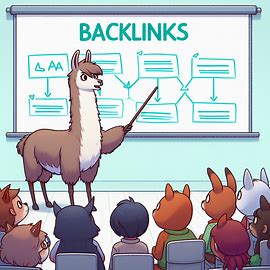The lead post in this series is Mastering Topical Authority: A Comprehensive Guide to Boost Your SEO.
Considering how the use of and the significance of backlinks has changed in this era of topical authority and EEAT, the very question is flawed, as it implies similarities, rather than a relationship between the two ideas.
Jump ahead to:
Why is the very question flawed?
The question asked in this blog post title is a true apples to oranges comparison.
By asking “How are these things different?” I implied they serve similar purposes, but differently.
But the don’t serve different purposes.
Topical authority is a framework for creating quality content, whereas backlinks are about external validation, which is to say they’re part of that overall framework.
Topical authority: Backlinks vs “external validation”
Prior to topical authority and EEAT being heavily pushed by Google, then forced upon us through Google algorithm updates, what mattered most in the world of external validation was backlinks from high DA (domain authority) sites.
Now we must think in terms of a broader concept of external validation, which includes backlinks, but is not exclusively focused on backlinks.
We also need to acquire good backlinks, and we need to NOT acquire bad backlinks.
Today, you work to boost your brand, not “just” your website
And while boosting your brand includes links, it doesn’t include links from any and all sites.
Some links will actually harm your brand’s reputation and your site’s ranking.
Backlinks show you’re known by the right people, but they can also show you’re known by the wrong people.
In today’s world, a backlink from a high DA site is not enough. There are other factors that matter, greatly.
Good backlinks
A good backlink is from a website where the site and the organization who own it have good reputations, the link is topically relevant, and is in the main content of the webpage.
Reputation
Organizations, brands, websites, and writers all have reputations.
A good reputation is one where you’re known for well researched in-depth posts and articles that explain things in simple easy to understand ways.
Links from such sites are significantly more valuable than links from poor reputation sites.
Topical relevancy
This is best illustrated by an example.
If your blog post is about good surfing locations around the world, links to articles about surfboard maintenance and/or surfboard wax are topically relevant.
Whereas links to articles about term life insurance are not.
Main content vs supplementary content
Google divides a webpage into two broad sections.
There is the header, the footer, the sidebar, maybe some ads, etc.
And then there is the actual blog post or article.
The actual blog post or article is the main content. Everything else is the supplementary content.
Links from the main content are more valuable to you than links from the supplementary content.
Bad backlinks
Almost by definition, any backlink that does not meet the criteria above as “good” is “bad”, and in some cases such links can actually HURT your site’s ranking.
We’ve all heard stories of sites being deprioritized by Google almost overnight via an algorithm update.
This is generally the result of the site having built “authority” via bad backlinks which became either irrelevant or harmful after a specific algorithm update.
Brand mentions
But today, the authority of your site, your brand, your business, etc, is not “merely backlinks”.
Brands get mentioned online. To build your brand, you need it to be mentioned online.
And what people say about your brand matters. Brand mentions can help or harm your site’s ranking.
In closing
Backlinks SUPPORT topical authority by providing needed external validation.
And the links that provide the strongest support comes from high reputation sites, are topically relevant, are in the main content of the website the link comes from, and are ideally accompanied by a positive brand mention.
